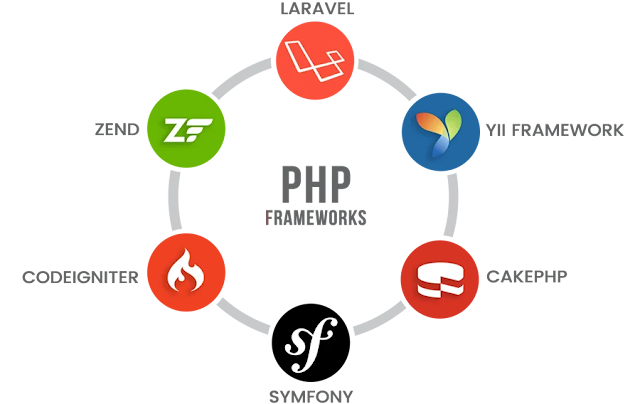Here's a list of the top 10 PHP frameworks along with their key features:
Laravel:
- Elegant syntax and comprehensive ecosystem.
- Built-in features for authentication, routing, caching, and more.
- ORM (Eloquent) for database interactions.
- Blade templating engine for efficient frontend development.
- Artisan command-line interface for automating tasks.
Symfony:
- Highly flexible and customizable framework.
- Component-based architecture for using specific components independently.
- Excellent performance and scalability.
- Rich set of reusable components.
- Bundles system for extending functionality.
CodeIgniter:
- Lightweight framework with a small footprint.
- Simple to learn and easy to deploy.
- Good performance and suitable for shared hosting environments.
- Active community and decent documentation.
- MVC architecture for organizing code.
Yii:
- Fast, secure, and efficient framework.
- Powerful caching system and security features.
- Supports rapid development through code scaffolding and Gii.
- Database access objects (DAO), active record, and query builder.
- Theming and skinning support for frontend customization.
CakePHP:
- Convention over configuration approach for rapid development.
- Built-in features like ORM, scaffolding, and validation.
- Strong emphasis on security with features like SQL injection prevention and CSRF protection.
- Mature framework with a dedicated community.
- Flexible and extensible architecture.
Zend Framework:
- Collection of loosely coupled components for building web applications.
- Robust support for MVC architecture.
- Extensible architecture with support for dependency injection.
- Integration with popular services like Google, Amazon, and Microsoft.
- Strong focus on security and performance.
Slim:
- Micro-framework for building lightweight applications and APIs.
- Minimalistic and easy to learn.
- Middleware support for adding additional functionality.
- URL routing with support for route patterns and placeholders.
- Dependency injection container for managing class dependencies.
Phalcon:
- High-performance framework implemented as a C-extension.
- Lower resource consumption and faster execution speed.
- Full-stack MVC architecture with ORM and caching support.
- Autoloading, dependency injection, and localization features.
- Flexible and extensible architecture.
FuelPHP:
- Full-stack MVC framework with HMVC support.
- Powerful ORM with support for multiple database types.
- Built-in security features like input and URI filtering.
- Template parsing with support for themes and layouts.
- Comprehensive documentation and active community.
Aura:
- Lightweight framework with a collection of decoupled libraries.
- Flexible architecture allowing for component-based development.
- Fully-featured router with support for RESTful routing.
- Dependency injection container and event system.
- Suitable for building both small and large-scale applications.
Each of these frameworks has its strengths and is suited to different project requirements. It's essential to evaluate them based on factors such as performance, ease of use, community support, and your specific project needs before choosing one for your development work.

Comments
Post a Comment